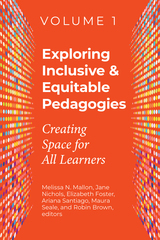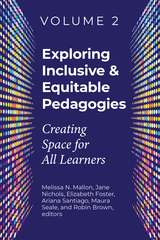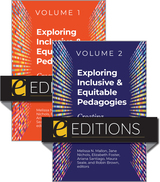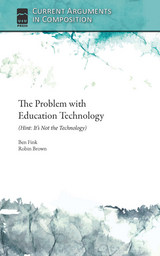
In Exploring Inclusive & Equitable Pedagogies: Creating Space for All Learners, seven thorough sections across two volumes examine:
- Anti-Racist Approaches
- Intentional Information Literacy
- Engendering Care and Empathy
- Community Building
- Universal Design for Learning: An Important Benchmark
- Instructor Identity and Positionality
- Professional Development
Chapters cover topics including dismantling, reexamining, and reconstructing notions of authority in information literacy instruction; teaching technology inclusively; using primary sources to research queer and feminist histories; cocreating knowledge practices with students; prioritizing accessibility in synchronous and asynchronous learning environments; cultural humility, funds of knowledge, and information literacy instruction with first-generation students; designing and managing inclusive group projects; and much more.
To become the instructors our students need, we must adopt the mindsets and develop the underlying skills to enact inclusive and equitable teaching and learning. Exploring Inclusive & Equitable Pedagogies offers reflections, practices, and models that deepen our collective understanding of equitable and inclusive theories and practices and present new grounding for both our individual teaching and our instruction programs.

In Exploring Inclusive & Equitable Pedagogies: Creating Space for All Learners, seven thorough sections across two volumes examine:
- Anti-Racist Approaches
- Intentional Information Literacy
- Engendering Care and Empathy
- Community Building
- Universal Design for Learning: An Important Benchmark
- Instructor Identity and Positionality
- Professional Development
Chapters cover topics including dismantling, reexamining, and reconstructing notions of authority in information literacy instruction; teaching technology inclusively; using primary sources to research queer and feminist histories; cocreating knowledge practices with students; prioritizing accessibility in synchronous and asynchronous learning environments; cultural humility, funds of knowledge, and information literacy instruction with first-generation students; designing and managing inclusive group projects; and much more.
To become the instructors our students need, we must adopt the mindsets and develop the underlying skills to enact inclusive and equitable teaching and learning. Exploring Inclusive & Equitable Pedagogies offers reflections, practices, and models that deepen our collective understanding of equitable and inclusive theories and practices and present new grounding for both our individual teaching and our instruction programs.

In Exploring Inclusive & Equitable Pedagogies: Creating Space for All Learners, seven thorough sections across two volumes examine:
- Anti-Racist Approaches
- Intentional Information Literacy
- Engendering Care and Empathy
- Community Building
- Universal Design for Learning: An Important Benchmark
- Instructor Identity and Positionality
- Professional Development
Chapters cover topics including dismantling, reexamining, and reconstructing notions of authority in information literacy instruction; teaching technology inclusively; using primary sources to research queer and feminist histories; cocreating knowledge practices with students; prioritizing accessibility in synchronous and asynchronous learning environments; cultural humility, funds of knowledge, and information literacy instruction with first-generation students; designing and managing inclusive group projects; and much more.
To become the instructors our students need, we must adopt the mindsets and develop the underlying skills to enact inclusive and equitable teaching and learning. Exploring Inclusive & Equitable Pedagogies offers reflections, practices, and models that deepen our collective understanding of equitable and inclusive theories and practices and present new grounding for both our individual teaching and our instruction programs.

Education is in crisis—at least, so we hear. And at the center of this crisis is technology. New technologies like computer-based classroom instruction, online K–12 schools, MOOCs (massive open online courses), and automated essay scoring may be our last great hope—or the greatest threat we have ever faced.
In The Problem with Education Technology, Ben Fink and Robin Brown look behind the hype to explain the problems—and potential—of these technologies. Focusing on the case of automated essay scoring, they explain the technology, how it works, and what it does and doesn’t do. They explain its origins, its evolution (both in the classroom and in our culture), and the controversy that surrounds it. Most significantly, they expose the real problem—the complicity of teachers and curriculum-builders in creating an education system so mechanical that machines can in fact often replace humans—and how teachers, students, and other citizens can work together to solve it.
Offering a new perspective on the change that educators can hope, organize, and lobby for, The Problem with Education Technology challenges teachers and activists on “our side,” even as it provides new evidence to counter the profit-making, labor-saving logics that drive the current push for technology in the classroom.
READERS
Browse our collection.
PUBLISHERS
See BiblioVault's publisher services.
STUDENT SERVICES
Files for college accessibility offices.
UChicago Accessibility Resources
home | accessibility | search | about | contact us
BiblioVault ® 2001 - 2024
The University of Chicago Press









